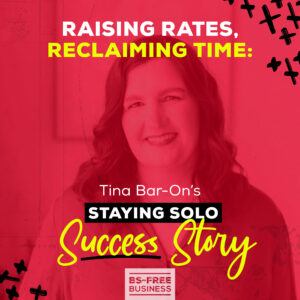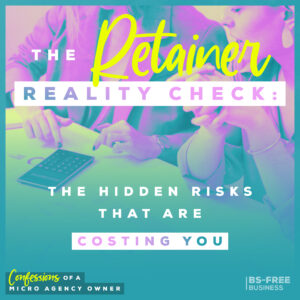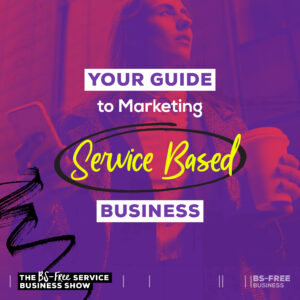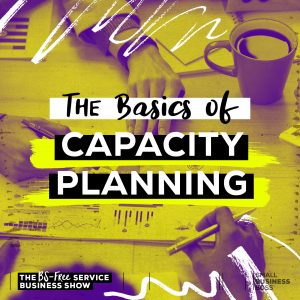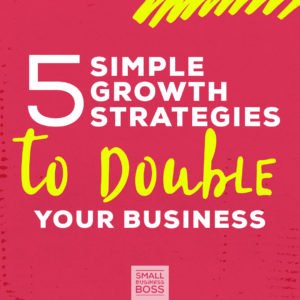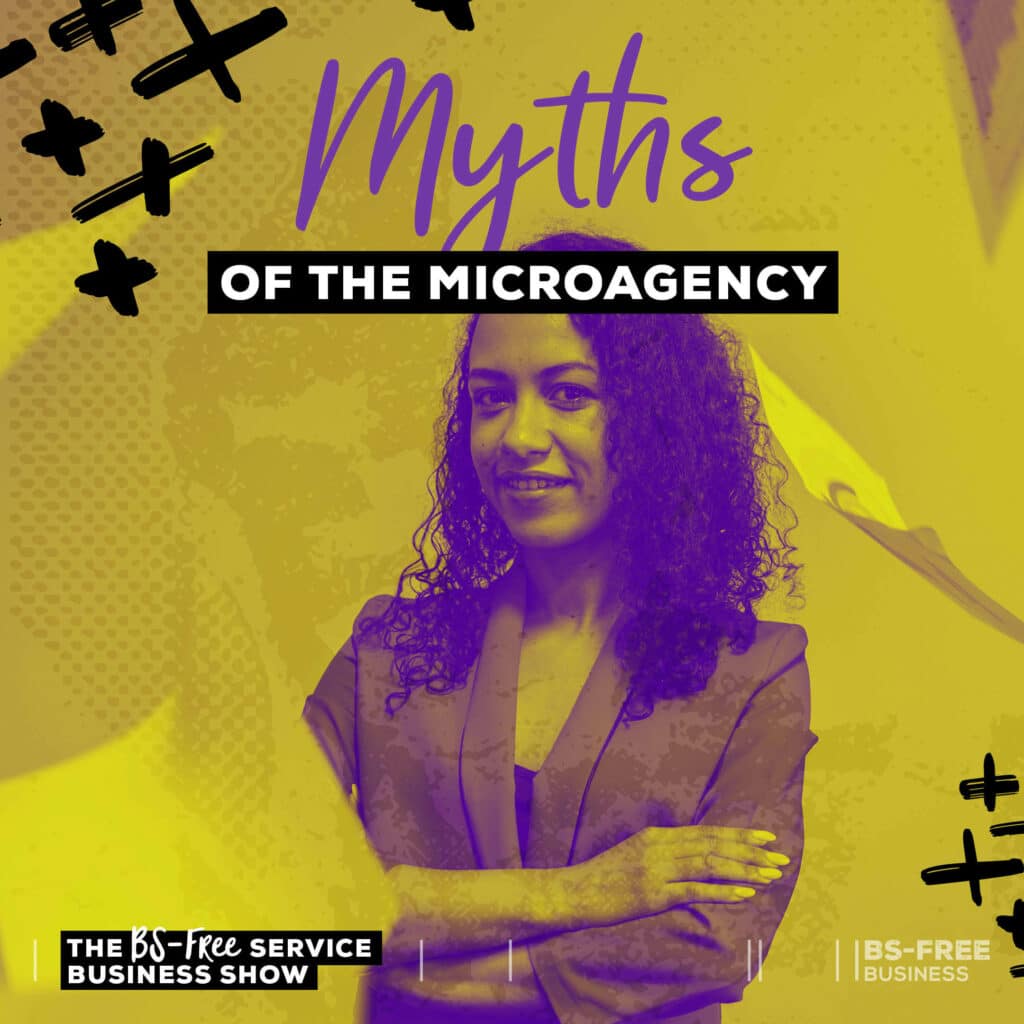
Search the site:
Myths of the Micro Agency
Like every business model out there, the micro agency is subject to a wide variety of myths that are total and complete BS. In this episode, I’m going to look at what a micro agency is and dispel four common myths
In the last episode, I talked about the idea that building an agency is the only way to scale a service business. While it’s not the only way to grow as a service business owner, it’s a proven path many people, including myself, have followed.
What’s often missing from the conversation about growing your business using the agency model is understanding that agencies don’t have to be these massive 20+ employee firms. There’s a middle ground between staying solo and having to grow and lead a big agency. Enter the micro agency.
What’s a Micro Agency?
Micro businesses are those with fewer than ten employees. From my point of view, this is the middle ground between a team of one and a traditional small business, defined as a company with up to 500 employees.
2019 data from the US Census found that of 8.0 million small businesses in the US, 4.3 million are microbusinesses with less than four employees. Just under 200,000 had 100 employees or more.
Most businesses ARE micro businesses, yet there aren’t enough examples of these types of businesses, especially agencies.
I define a micro agency as a service business offering done-for-you services with a small team of employees and/or contractors. The number of people matters less than the actual structure of the company.
For me, having a micro agency has been a way to grow in a way that allows me to have a lifestyle-driven business.
Now, let’s talk about some of the most common myths about micro agencies. I wanted to explore these myths based on input from the current cohort of the Agency Mastermind.
As a group, they shared with me things they may have thought as they set out to grow an agency and common misconceptions that make them want to scream into a pillow.
Myth #1: You’ll Grow Quickly
This first myth is one I fell prey to, as despite years of agency experience, I thought I would continue to grow on the same trajectory as a solo business owner.
When people talk about shifting into the agency model, it’s seen as a natural move where you’ll simply keep doing what you’re already doing. While your services may not change much, your business’s foundation needs to evolve to support both a team and working with more clients.
Those foundations require resources, which will require your time and attention in those early days. When I think back to when we started Scoop, much of my energy went into this, distracting me from focusing on marketing and sales activities. As a result, growth continued, but not at the velocity I was used to.
The other factor is that your marketing and sales pitch needs to evolve from “I’m a service provider who can help” to “Here’s how our team can help”, which requires you to reposition yourself as the agency leader. That may seem obvious, but it’s an area that many people struggle with as they’re used to selling themselves, and for the agency structure to work, there’s a more significant shift than expected.
None of this is to say you won’t grow because you absolutely will, but rather that you need to be acutely aware that it’s not as simple as it’s often portrayed. Complexity and nuances are overlooked amid our excitement and entrepreneurial optimism.
Myth #2: You’ll Make More Money
One of the driving factors for most people to start an agency is for them to be able to make more money. What often happens is that people reach an income ceiling with their services and an agency seems like the logical next step.
Honestly, I would never recommend that people choose an agency as a surefire way to make more money. While your profit margin as a solo business owner maybe 70% to 90%, you can expect that to be more like 40% or 50% as an agency owner.
Growing an agency requires careful and calculated money management at every step. Many factors impact your ability to make money, from pricing to profit margins to team compensation to capacity. The agency owners with a 40%, 50%, or more profit margin proactively manage these money-related metrics.
You may be wondering if agency owners make more money based on what I just said, and the answer is that it depends. The micro agency owners I work absolutely do as they’re on top of these metrics and taking calculated risks. But they’re also motivated by factors beyond the money such as working as part of a team, having more flexibility, and being a mentor to their employees.
On the flip side, I’ve seen my fair share of agency owners collapse under the stress of low-profit margins as they hire to scale up. Too many times client budgets and their pricing don’t keep pace. In that scenario, agency owners end up underpaid, resentful and disgruntled.
Honestly, I would never ever start an agency as a way to grow my personal take-home pay quickly. Building an agency, even a micro agency, requires patience, time and effort. It’s a far cry from the ads all over my Instagram, promising a million-dollar agency within 12 months.
Myth #3: You’ll Be Totally Hands Off
The next myth is super appealing to solopreneurs who are tired or burned out. One of the most enticing parts of growing an agency is that you won’t need to do everything yourself and that you can be much more hands-off.
Here are the cold, hard facts. Getting to the point where you can be hands-off takes much longer than anyone could ever imagine. Unless you’re in a situation where you have the resources to hire a full-on replacement for you and have magical powers whereby you can instantly download your brain into their head, this is a long-term project.
By long-term project, I mean one that will take years. Truth be told, with a micro agency you may never get to the point where you can be completely hands-off. Sure, you can take a vacation and not do everything yourself, but micro agency owners still work in the business, talk to clients, and lead the team.
If you’re currently an agency owner who’s frustrated that you’re not there yet, look for incremental improvements over time. Focus on your foundations and leading in a way that enables you to give your team agency (pun intended) over decisions on an ongoing basis.
And if you really want to be hands-off, hate the client work you’re doing and all of the things that go with running an agency, maybe this isn’t the right business model for you. For some reason, I think the celebrity entrepreneurs have sold the idea of an agency as an alternative to courses or programs that can be passive.
Myth #4: Bigger is Better
Remember when I said a micro agency has up to ten employees? That doesn’t mean you have to have that many employees. That’s just the technical definition of what makes your agency “micro”.
Bigger doesn’t automatically mean better when it comes to your agency. As I shared in an essay on scale last year, micro businesses can easily run into issues as they enter the “valley of death”.
This term was coined by Vern Harnish in the book Scaling Up. The Valley of Death is a phenomenon where there’s a danger zone the company must travel through, and many companies don’t come out alive. In his model, he discusses how many companies never make it past the one-million-dollar mark.
Only 9% of US-based small businesses hit the 7-figure revenue mark, and only 4.2% of women-owned businesses reach this milestone.
It’s a far cry from the 7-figure hype about businesses constantly being sold. I don’t think the real threat for micro businesses including micro agencies, is as they approach 7 figures.
Based on my experiences, there are specific revenue break points where service business owners tend to find themselves stuck including in the range of $100k to $150k per year, $250k to $300k, and as they move past the $500k mark.
These are not hard and fast numbers as they may vary, but those are points in the journey of growing a business where you need to make critical decisions about foundational aspects of the business including pricing, team, services and more.
For micro agency owners, this is why they need to carefully and thoughtfully decide what the best course of action is for them. It’s easy to believe that adding more team members and having more clients is the best way to go, but it comes down to the math, your level of risk tolerance and what you really want from your agency.
There’s no right or wrong answer, but it’s worth pointing out that you don’t have to have a big agency to land big-name clients in the current climate. When I look at the caliber and cache of the brands many of the people in the Agency Mastermind serve, I see the proof that bigger isn’t automatically better.
The agency I started my career in started as a micro agency, and it grew steadily over time. In the over five years I worked there, I saw the founders actively engaged with clients, doing new business development and leading the team. To grow in the way they did, they remained involved for years.
Map Out Your Own Micro Agency Path
Ultimately, you get to map out your own path to what your micro agency looks like, but I want each of you to know that like every other business model, there’s actual work involved. I’ve yet to find an agency owner, or any other service business owner for that matter, who’s not contributing to the business somehow.
Everything I talked about in today’s episode is a myth for a reason. It’s total BS, and it’s designed to make you feel like you’re not doing the agency thing right (usually to sell you something), or worse yet, it’s “advice” from people who don’t know WTF they’re talking about.


I’m Maggie Patterson (she/her), and services businesses are my business.
I have 20+ years of experience with client services, am a consultant for agency owners, creatives, and consultants, and vocal advocate for humane business practices rooted in empathy, respect, and trust.
For Solo Business Owners

Growing a solo service business is tough.
It’s even harder when you’re bombarded with BS advice that steers you away from your values and why you started your business in the first place.
This is the podcast for solo creatives and consultants who want to remain as a team of one and have zero interest in the hustle and grind of typical business teachings.
Subscribe now and never miss an episode.
For Micro Agency Owners
Most podcasts for agency owners obsess over revenue growth as the ultimate success metric.

But here’s the truth: not everyone wants to make millions. Your goal might be to build a sustainable business that lets you have a life and doesn’t run you into the ground.
Join me as I spill my shameless confessions and share everything I’ve learned about building a micro agency that skips the BS of tired and typical agency teachings.
Follow Now on All Major Podcast Platforms
